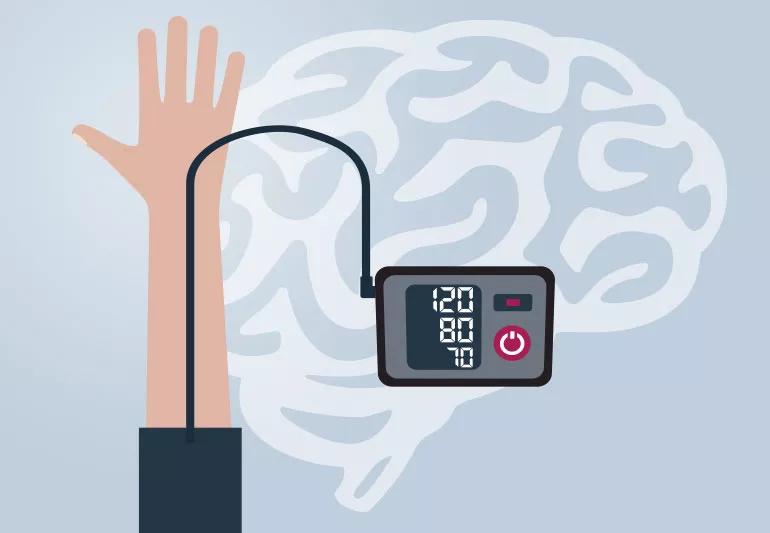Study underscores importance of managing BP

Image content: This image is available to view online.
View image online (https://assets.clevelandclinic.org/transform/a5942ea1-6caf-4565-bede-c13d8df284ee/bpAndBrain-921089652-770x553-1_jpg)
Taking a blood pressure check with an image of a brain in the background
It’s not just your heart health you’ll improve when you manage your blood pressure. A national study found that optimizing blood pressure targets could help your memory too.
Advertisement
Cleveland Clinic is a non-profit academic medical center. Advertising on our site helps support our mission. We do not endorse non-Cleveland Clinic products or services. Policy
While people’s blood pressure (BP) fluctuates all the time, the ideal BP target is 120 over 80. The first number (systolic BP) indicates the pressure against your artery walls when the heart beats. The second number (diastolic BP) indicates the pressure against your artery walls when your heart is resting between beats.
Over the years, medical guidelines have suggested managing systolic pressure to different targets, from under 140 to under 130, with recent guidelines suggesting management to under 130.
Doctors typically give more attention to the first number because it’s the major risk for cardiovascular disease — especially as we age.
SPRINT (the Systolic Blood Pressure Intervention Trial), a study of the heart health of more than 9,000 people ages 50+ sponsored by the National Institutes of Health, recently did a subanalysis called the SPRINT MIND trial. It looked at the brain health of a smaller group of almost 700 patients whose blood pressure was managed to 120 (or less) versus a group managed to 140.
These patients received brain scans at the beginning of the trial and again four years later. Researchers found that those who managed their BP to 120 lowered their chances of developing white matter in the brain by a third. (Less white matter means less chance of developing cognitive impairment.)
Advertisement
The SPRINT MIND trial’s take-aways: “We regularly see patients with memory problems and grapple with mysteries that continue to surround the development of Alzheimer’s disease and other forms of age-related cognitive impairment,” says geriatrician Ronan Factora, MD. “So we’re naturally excited to see large, randomized trials like the SPRINT study where the findings can have a dramatic impact on patients’ health. These results give older patients who have high blood pressure, but are otherwise healthy, a strong incentive to work toward the less than 120 blood pressure target.”
But the SPRINT MIND findings are far from a one-size-fits-all prescription, Dr. Factora cautions.
There are some medications and diseases that can complicate blood pressure management.
But the study excluded patients who had diabetes, kidney disease and a number of other conditions. That means that it didn’t take into account many real-life scenarios related to managing high blood pressure.
He notes that there’s also the other end of the spectrum, when blood pressure is managed so closely that it becomes too low, which can lead to light-headedness or dizziness when standing up.
“Especially for older patients, we have to be careful that their blood pressure isn’t so low that it leads to a fall and a broken bone,” Dr. Factora says. We must make sure the SPRINT MIND guidelines are appropriate for each patient we see, taking into account that person’s medical conditions, medications and ultimate medical goals.
That said, if hypertension is the only significant medical problem you’re dealing with, Dr. Factora recommends working with the help of your physician toward the less than 120 blood pressure target.
Advertisement

Sign up for our Health Essentials emails for expert guidance on nutrition, fitness, sleep, skin care and more.
Learn more about our editorial process.
Advertisement
An ideal blood pressure is less than 120 mm Hg systolic and less than 80 mm Hg diastolic
Steer clear of bells and whistles — simple, affordable monitors are all you really need
Stay on top of your health by monitoring your blood pressure regularly
Labile hypertension tends to be situational, but still warrants medical attention
Certain supplements, like licorice root and St. John’s wort, can raise your blood pressure or negatively interact with medication
Strokes affect your brain, while heart attacks affect your heart — both can be life-threatening emergencies
Options for your changing mobility range from small swaps to major renovations
To help preserve your cognitive function, try to keep your brain active, manage fatigue and learn new organizational skills to conserve energy
Although it could be used as a moisturizer, this new trend is not recommended
Communicating clear limits helps protect your time, energy and emotional well-being
High cholesterol can be genetic, but testing and treatment can lower your heart disease risk